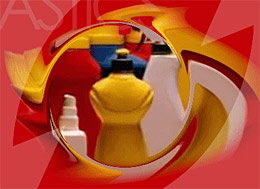New Studies on Legal Chemicals Bode Ill for Human Race
 Talli Nauman - The Herald Mexico Talli Nauman - The Herald Mexico


| | For reproductive rights watchdogs and children's health advocates the issue of chemical emasculation is particularly important. |
As plastics proliferate in Mexico, the big news in environmental health journals these days about their hazardous phthalate content is a scientific wake up call to parents and other living creatures to shun needless synthetic products and choose non-toxic alternatives.

Since the plastics industry in Mexico blocked a citizen-based government initiative to control proliferation several years ago, no consumer protections are in place. So it is incumbent on moms, dads and prospective ones to inform themselves and make wise decisions about the goods they bring into their homes.

A couple weeks back when I was at a huge meeting in Washington, D.C. on community environmental right-to-know, one of the four main subjects that activists addressed was the issue of the toxic chemicals we legally put into our bodies by rubbing on cosmetics, deodorants and the like. So it's not just Mexico that lacks protections against these agents that cause everything from birth defects to cancer.

Quite simply, phthalates could put an end to the human race. That's what folks at the National Institute of Environmental Health Science, the University of Minnesota and other science centers are inadvertently demonstrating. Their studies all show that phthalates interfere with male reproductive development, result in smaller genitals, and are dangerous to cells in the testes that otherwise assure normal sperm and hormone production.

It's too late now to avoid exposure, since phthalates are released in the manufacturing process and escape from the merchandise they are in. But reducing your exposure is within your means, so you best do it. Even if you personally are unaffected health-wise, your future offspring could be. Young, developing people are the most susceptible to the effects.

Phthalates are used to make things flexible. They are found in hair spray, fragrance, deodorant, nail polish, food, drugs, PVC (polyvinyl chloride), lubricants, building maintenance products, adhesives, caulks, skin creams, detergents, electrical capacitors, inks, solvents, lotions, aftershave, paints, toys, teethers, diaper pants, drinking straws, flooring, wallpaper, shower curtains, fabrics, gloves, tarps, garden hoses, shoes, autos, paper packaging materials, sealing gaskets, blood storage bags, catheters, tubes, syringes, cardiopulmonary bypass apparatus, mattress pads, water beds, inflatable furniture, balls, backpacks, umbrellas, purses, luggage and . . . you name it!.

They are absorbed through the tissues, passed along to fetuses through placenta and administered to babies through breast milk. They are seldom labeled as phthalates, and the aggregated impact of their consumption is not officially being studied, much less regulated.

For reproductive rights watchdogs and children's health advocates the issue of chemical emasculation is particularly important.

Millions of tons of phthalates are produced annually around the world. As if that weren't enough, they are just one family of chemicals that causes health problems through its incorporation in our manufactured products. Glycols and organic solvents are examples of others.

It's good to know about them and avoid them as much as possible. But it's not quite good enough. The makers of the products that contain them must be brought to task, in the interest of assuring a safer environment.

If we don't insist on access to information about these insidious toxics; if we don't obtain policies for protection, and if we don't achieve cleaner methods of production, we will get our due. We will continue polluting the ecosystem until we have polluted ourselves out of it.

Talli Nauman is a founder and co-director of Journalism to Raise Environmental Awareness, a project initiated with support from the MacArthur Foundation. She is a program associate at the Americas Program of the International Relations Center. (talli@direcway.com) |



